The GoPro line of cameras has always been known to be action-oriented, and such has been appreciated by outdoorsy folks. However, that hasn’t stopped a multitude of users from buying GoPros for their day-to-day shooting. Unveiled a couple of months ago, the GoPro Hero 11 Black is the latest iteration of its action camera. While not exactly a leap in terms of design, the GoPro Hero 11 does bring improvements in some areas, including a new sensor, improved stabilization, and more. But does the Hero 11 perform as per expectations and can daily joes consider buying it? Well, I took the GoPro Hero 11 out for a spin, captured some footage around the area I live, and this is what I found.
GoPro Hero 11 Black Review (2022)
GoPro Hero 11 Black: Specifications
Before we dive into the other more important stuff, including my opinions, check out what’s new in the Hero 11 below:
| Dimensions (W x H x D) | 71.8 W x 50.8 H x 33.6 D (mm) |
| Weight | 154g |
| Image Sensor | 1/1.9" CMOS |
| Processor | GP2 |
| Max Video Resolution | 5.3K: 8:7 (5312x4648) |
| Max Photo Resolution | 27.13MP (5568x4872) |
| Battery Size | Removable 1,720mAh Enduro Battery |
| Waterproof | 10m (33ft) |
What’s New in GoPro Hero 11 Black?
The GoPro Hero 11 was launched a few months ago for adventure users. I will mention the design changes below, so let’s talk about the new features inside the camera. For GoPro Hero 11, the first and most notable change is the new 8:7 sensor. This brings a weird yet useful aspect ratio for video creators. The new sensor allows the Hero 11 to capture higher-quality and better-composed photos and videos. As for why this aspect ratio, well, GoPro seems to think it gives you the opportunity to capture more and then crop it according to your needs – be it for TikTok, Insta, or even YouTube videos.
The newer sensor also brings a wider field of view for more immersive videos. The GoPro Hero 11’s digital lens can take the 8:7 aspect ratio and deliver footage up to 16:19 for ultra immersion. The new sensor also means you can now show 27MP photos compared to the 23MP on the Hero 10.
Another significant addition to the Hero 11 is the ability to record in 10-bit color. This is a much-needed bump for professionals who want to take things further with color grading. 10-bit color naturally gives better freedom in color correction and editing. However, be aware that you will require a beefier than normal PC to properly do the post-processing.
GoPro Hero 10’s HyperSmooth 4.0 was seen as a big improvement on the stabilization front. The Hero 11 takes things further with the new HyperSmooth 5.0 feature. HyperSmooth works by intelligently zooming in when detecting shakiness. By zooming in, the Hero 11 is able to stabilize jittery footage easily. Check out the footage we have attached in the video samples later in this review.
For those unaware, Horizon Locking makes sure the horizon stays level when the camera is being tilted in all sorts of directions. GoPro Hero 11 Black now allows for full 360-degree Horizon Locking, meaning you can tilt your camera whichever way and the horizon remains stable. This is an addition to the HyperSmooth 5.0 engine and is sure to help produce consistent videos.
Besides these notable features, the Hero 11 also comes with three new night modes to improve Time Lapse experiences. The beautiful Star Trails mode uses the Earth’s rotation and stars to capture light trails across the sky. The Light Painting mode helps you create brush stoke effects with moving lights and the Vehicle Light Trails lets you use nighttime traffic for trails.
GoPro Hero 11 Unboxing
My GoPro Hero 11 Black came in a modest-sized but well-organized box that packs the camera and its related accessories. The box itself is themed in black with oceanic wallpaper. It uses a flip-to-open design, kind of like a book. Once you open it, you are met with the features on the left flap and another scenic photo in the middle.
Fully unfurling the box reveals the GoPro Gumby, a 360 rotatable flexible mount you can attach to your GoPro and then use to mount it anywhere. The Gumby is made out of rubber twist ties that use a flexible swivel mount design that you can attach anywhere. To simplify it even further, consider it an advanced version of a Gorilla Pod.
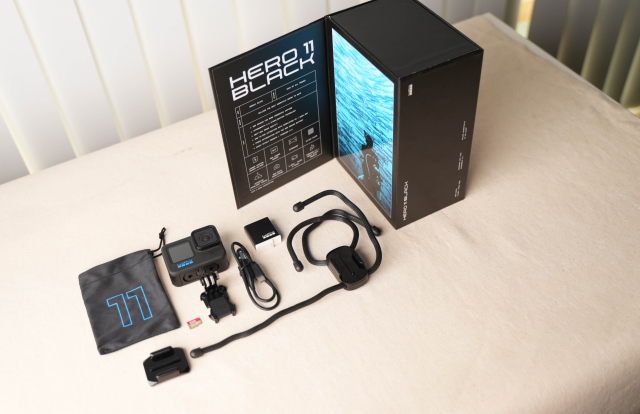
The Hero 11 also comes with two clamps that can attach to the Gumby and the GoPro for further mobility. This means I could strap on the GoPro Hero 11 on almost any surface, including railing, tables, bike helmets, and more. If you are in the business of recording a lot of POV stuff, you can use this to its full potential. Further included in the package is a USB-A to Type-C cable, a small pouch, and well, the camera itself.
My overall experience of unboxing the Hero 11 was clean, organized, and most of all easy. This is the one area where I did not need action, and I’m thankful I didn’t. This is the reviewer’s packing by the way, and the retail packaging will look slightly different.
GoPro Hero 11 Design
The Hero 11 is the newest GoPro action camera but that doesn’t mean it comes with any specific changes. And to solidify that, the Hero 11 comes with little to no design changes. The exterior of the GoPro Hero 11 is the same, except you get an 11 printed on the side. The camera features a compact, rectangular design same as found in the Hero 10.
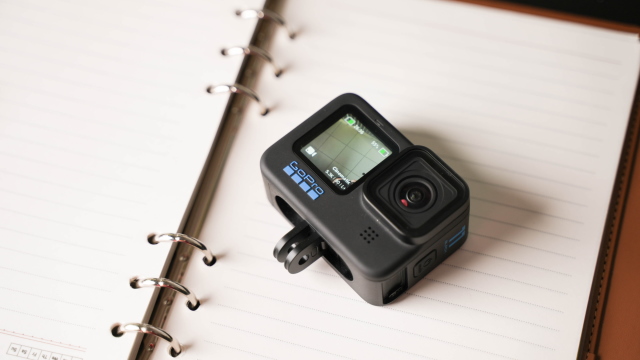
You have a matte black finish that extends around the body. You naturally get two displays, one on the front and back of the camera for both points of view.
Besides that, the camera has mounting tabs, side covers, and the same overall design. Carrying forward the same story, the GP2 processor from Hero 10 has not changed, but the Hero 11 does come with an upgraded Enduro battery. It was previously available as an accessory but is now included in the box. While the capacity remains the same at 1,720 mAh, GoPro has upgraded the chemistry, which should make it last longer.
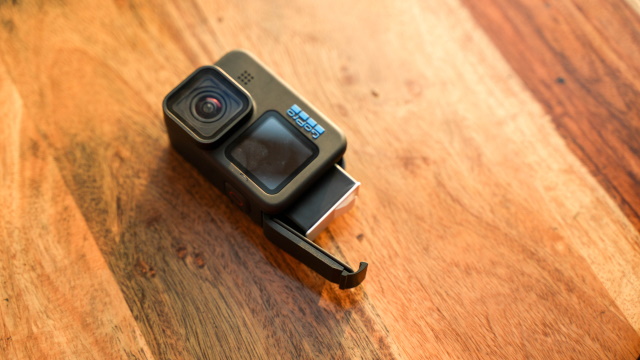
As for portability, the Hero 11 retains its slim design. This meant I could easily put the camera in a pouch or my sling bag and take it with me anywhere without hassles. The small profile of the Hero 11 can be taken in person or just tucked in your bag. While the Gumby mount can get a bit weird to carry, it was portable enough.
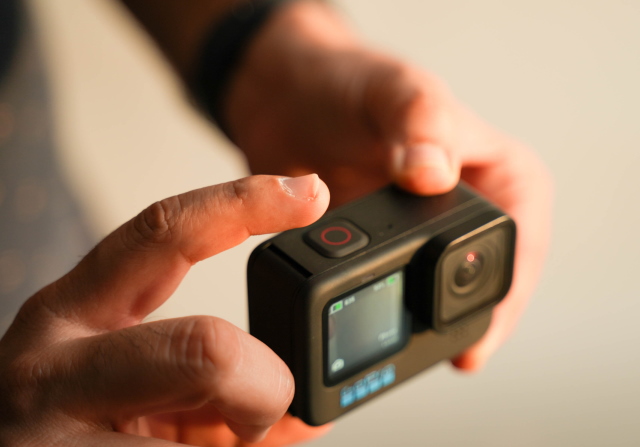
Overall, the Hero 11 doesn’t really pack a lot of design improvements. However, if you’re someone getting it for the features, sure do.
GoPro Hero 11 Camera UI/UX
GoPro Hero 11 comes with largely the same user interface found in the Hero 10. The overall menu design is simple with handy menu buttons for everything. You get your traditional sliders for when you want to switch FOV modes. Other options, including those to switch video modes and adjust image settings, are easy to reach and neatly organized. Overall, the GoPro Hero 11’s UI is simple and easy to use, even for newbies.
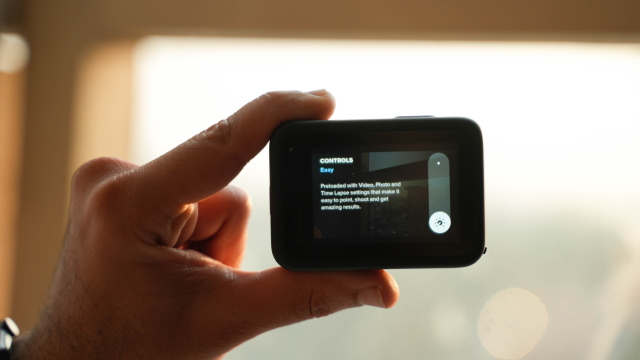
However, GoPro has made things easier when it comes to shooting. The Hero 11 now comes with an all-new Easy Mode. It is a welcome change for newcomers. Basically, Easy Mode lets the users choose from either the Highest Quality and More Battery Life. Once done, the camera will adjust all the other settings, and you can get to the main part – shooting the video. However, for pro photographers, Hero 11 camera retains its Pro Mode.
GoPro Hero 11 Camera Performance
The GoPro Hero 11 comes with a variety of video modes to fit the video needs of content creators and general users. While my use of the GoPros isn’t expansive, I took the camera out for a few trips around my area. I’ve categorized the various video modes below, so browse through them depending on what you’re looking for.
HyperSmooth Stabilization
Nobody likes a jittery video and a shaky experience. As mentioned above, the GoPro Hero 11 comes with a new HyperSmooth 5.0 engine for better stability. As such I decided to test it out. My testing condition was a normal walking pace going down an empty road. I made sure not to rush a lot and maintain an even pace. I shot both videos in 5.3K @ 60FPS. After going through the before and after videos, I was blown away by the difference.
As you can see yourself, the video with any stabilization off is extremely jittery and almost looks like I’m doing it on purpose. While the video quality does look nice, it’s not exactly useable in this state. Turning on HyperSmooth 5.0 makes a world of difference. The video now is extremely stable with little to no jitter whatsoever. It’s almost unbelievable how stable the video becomes even though I’m walking at the same pace. The video quality remains vivid with beautiful color accuracy, proper light reproduction, and overall detail. If you’re looking for super stable videos, buy the Hero 11 with prejudice.
360 Horizon Lock
Save for adrenaline junkies, Horizon Lock is one of the few features that some folks might not use at all. However, it’s still a handy feature for when you want to use it. Nonetheless, I tried the Horizon Lock and was fairly impressed. I recorded a video with the same 5.3K/60FPS setting and maintained an even level of scenery with some tilts here and there for other elements.
The output video was again amazing as Horizon Lock, well, locked the horizon and kept the camera from tilting extremely. As you can see, it also maintains an excellent level of stabilization even when I was moving the camera around. The upward tilts are also recorded with the same stability, and I loved the overall quality here. While I could not find an opportunity to test out the Horizon Lock in extreme scenarios, I have confidence that it can maintain its performance there too.
HyperView
GoPro Hero 11’s new 8:7 sensor not only brings better image quality but as mentioned enhances the FOV. This, in turn, brings an upgraded version of Super View called HyperView. HyperView takes the now taller sensor and puts it into a 16:9 format. The result is extremely wide videos. To test HyperView, I thought the best way would be to get into a car and see how far I can stretch it.
The resulting HyperView video is a good combination of a big FOV and quality. The entirety of the car cabin is fully visible with a clear cover of the outside. In the second half of the video, I took the camera out to capture more of the area, and the same effect was reflected.
As expected, there is some visible distortion on the sides because of the 12mm coverage. Furthermore, there is some graininess in the video but nothing major. A small thing to note is that the built-in mic also recorded ambient sounds decently. Overall, I quite enjoyed testing the GoPro Hero 11’s HyperView mode and plan to use it again on hiking trips to capture the amazing and vivid scenery.
Slow Motion
The GoPro Hero 11 can also record slow-motion videos up to 240 FPS. While walking into oncoming traffic is not something I do regularly, I decided to stand a bit closer and record a few videos in slow motion and wasn’t disappointed.
The resulting video, as you can see yourself, looks just wonderful. Although I did notice some quality loss in the video, nonetheless, the slow motion was accurately reflected and looks adequate for the average user.
Photography
The GoPro Hero 11 Black can capture 27MP high-definition photos because of its upgraded sensor. While the quality leap is not exactly generational, I snapped a few photos (click to enlarge) in various scenarios.

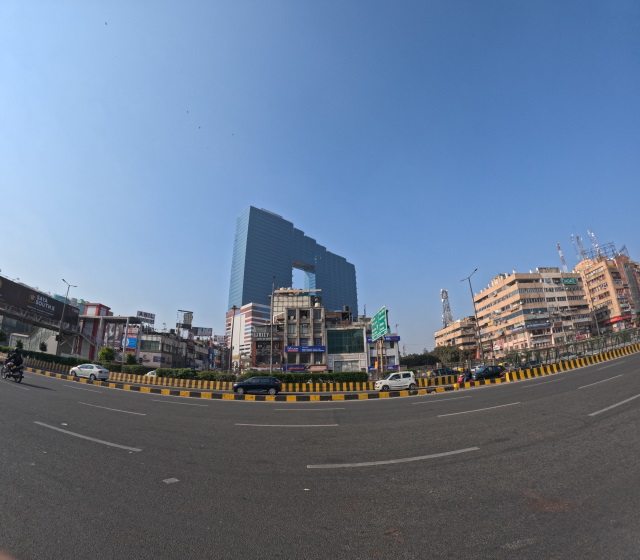
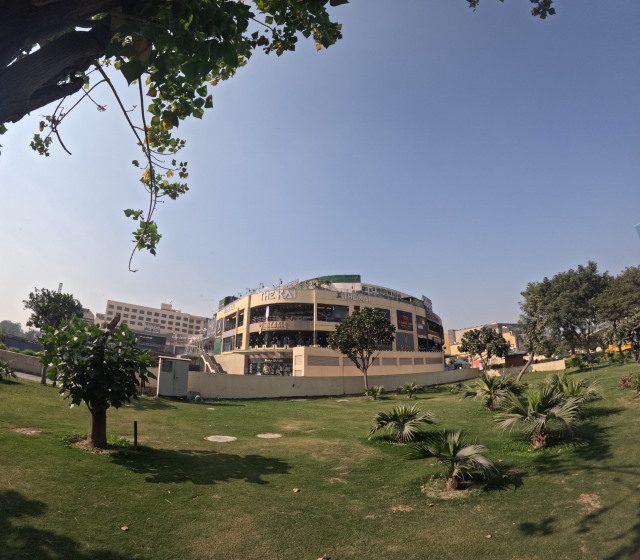
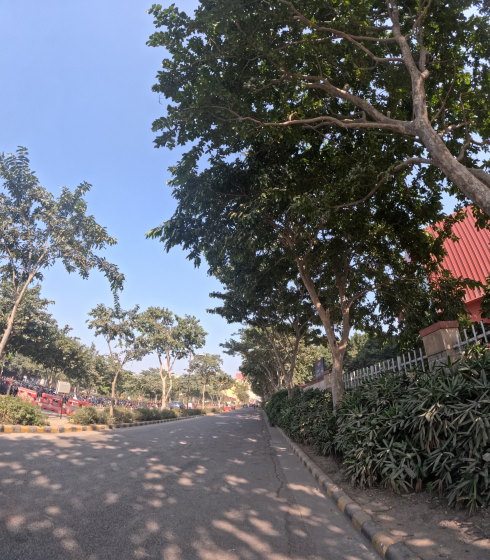
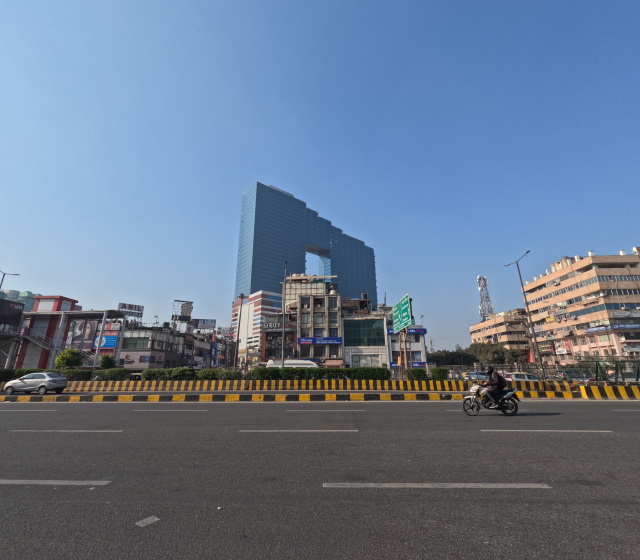

I found the overall output photos pretty satisfactory. The Hero 11 Black has a good emphasis on color accuracy and quality. A thing I have to give GoPro props for is the fact that the quality remains consistent no matter if you are taking normal or wide-angle shots. This meant I could easily switch back and forth between modes and expect the same photo quality. The Hero 11 also handled light quite well, considering it was sunny outside. Overall, I found Hero 11’s photo-capturing capabilities to be good.
GoPro Hero 11 Battery Life
As mentioned above already, the GoPro Hero 11 Black comes with an Enduro battery with a capacity of 1,72o mAh. GoPro promises up to 61 minutes of battery life when shooting at 5.3K @60 FPS. And in our experience, the claims proved to be largely true. I shot the above videos and a combination of photos in moderate weather conditions. I began the session with the GoPro Hero 11 Black at 100% battery. At the end of my recording, the GoPro had 69% battery left. Since I used a variety of video modes rather than a single one, I feel the camera had a good amount of battery life.
GoPro Quik App Experience
I don’t think there’s a gadget left that doesn’t have its own app. I found that the GoPro Hero 11 is one of the ones that do. Called the GoPro Quik, the app is an all-in-one control panel for the camera and everything related to it. Setting up the camera was easy enough for me, even with all the pairing errors at the start.
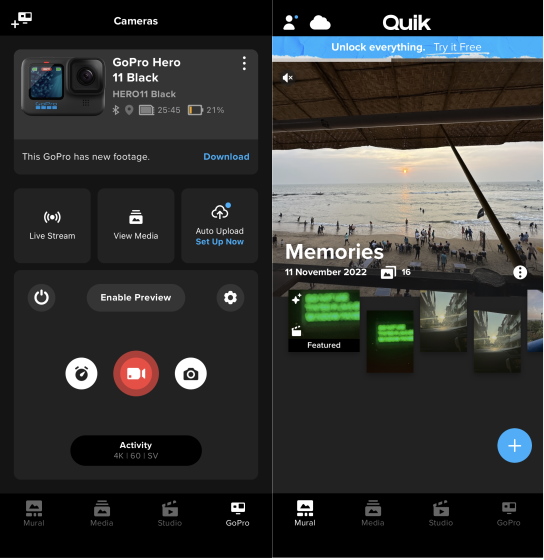
The app itself has been designed with a simple user in mind. I’m not particularly used to camera apps in general but I found using the Quik app easy enough. Quik now features an upgraded design and is supposed to be easier. One of the primary features of the Quik app is GoPro control center, which shows you everything about the camera with a single glance. I could see the camera’s battery, storage, Bluetooth, and GPS status in real-time.
There is also a handy preview button that lets users view real-time footage from the camera’s viewfinder with ease. However, it goes a step further, allowing me to fully control the camera besides previewing. I easily changed shooting and video modes, switched to the TimeWarp, edit shooting settings including resolutions and FPS. GoPro even offers users to switch to easy mode right from the app in case they can’t locate it in the camera settings.
The Quik App also has what it calls Mural, which is basically a collection of your best photos and videos. The app offers to pull media not only from the camera but your phone too. I combined the images and created a personalized mural, which actually worked well. However, to access the full features like premium video and photo editing, GoPro offers a subscription with its action cameras. Nonetheless, GoPro Quik is a handy and easy-to-use app.
GoPro Hero 11 Pros and Cons
To round up everything we have discussed in this review, check out the pros and cons of the new GoPro Hero 11:
| PROS | CONS |
|---|---|
| New 8:7 Sensor; enhanced quality and FOV | Could have updated the design |
| HyperSmooth 5.0 is crazy good | Occasional noise in HyperView videos |
| 360-degree Horizon Lock offers new adventure opportunities | Pairing errors with GoPro Quik app |
| Easy Mode is helpful for beginners |
GoPro Hero 11 Black Pricing
Go Pro Hero 11 Black retails at the price of $399.99 on Amazon in the US and Rs 50,499 on Amazon in India. There is also an optional accessory bundle on GoPro’s official site, which costs $549.99 without GoPro Premium and $399.99 with it. However, if you’re willing to look past the “NEW” tag, you can consider last year’s Hero 10 Black. Priced at $384.99 (or Rs 38,000 in India), the GoPro Hero 10 bundle comes with a dual battery charger, an extra battery, and a 64GB SD Card. But considering the GoPro Hero 10 has the same pricing as the new model, it would make better sense for beginners to start off with the latest one and all the new features.
Those on a budget can consider more affordable alternatives like the DJI Osmo Action 3, which costs $329 on Amazon. However, be aware that it lacks some features like the 5.3K video resolution.
GoPro Hero 11 Black: Upgraded But Is It Enough?
The GoPro Hero 11 definitely comes with some upgrades that might tempt users to spend the bucks. My experience with using the Hero 11 was a good mix of portability and performance. The camera footage with good quality while retaining the mobility that GoPro owners have come to love. I especially appreciated the 360 Horizon Lock feature that opens up the potential to do some crazy stuff. However, upgrading from the Hero 10 Black to the Hero 11 for a select few features is not worth the money in our opinion. You won’t see drastic improvements, as the product is iterative. So what do you feel about this? Do you feel the new 8:7 sensor along with the 10 Bit color is worth the plunge? Drop your thoughts in the comments below.
REVIEW OVERVIEW
SUMMARY
